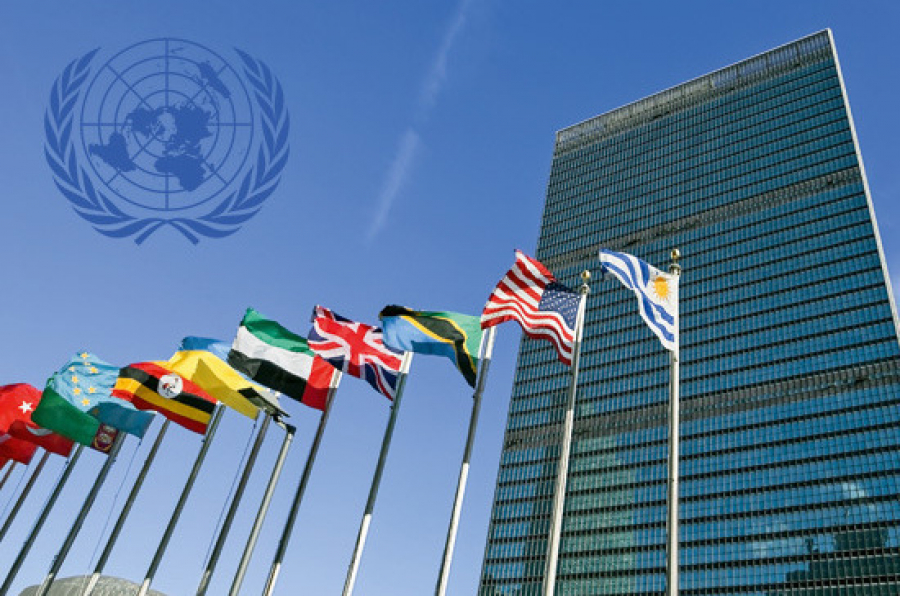Statement of Minister of Foreign Affairs of the Russian Federation Sergey Lavrov during an open debate of the UNSC "Situation in the Middle East, Including the Palestinian Question", presented by Deputy Foreign Minister Sergey Vershinin
Russia convened today’s meeting as the Security Council President, in view of the importance to the international community of devising consolidated approaches to settling regional crises.
The long-standing Israeli-Palestinian conflict lies at the epicentre of the upheavals in the Middle East. This problem has remained a source of international and regional discord for more than seven decades while providing an ideological rationale for terrorist and extremist groups around the world.
Absent a settlement, the conflict has brought unspeakable suffering to the people of Palestine and Israel, to the Arab states and the numerous Palestinian diasporas located there, including people living in Palestinian camps.
This state of affairs resulted from attempts to reverse the situation single-handedly, without collective or coordinated efforts, reaching a point where unilateral initiatives have not only ignored, but have undermined the international legal framework for the Israeli-Palestinian settlement as approved by the UN and set forth in Security Council and General Assembly resolutions. This has led to a new impasse that threatens to undermine regional stability.
While maintaining constructive, partnership ties with all the countries in the region, Russia views the improvement of Arab-Israeli relations to be a positive development. At the end of the day, achieving a comprehensive and just settlement in the Middle East has always been and remains an integral part of Russia’s policy in the region.
At the same time, as the Arab states and Israel normalise their relations, the Palestinian question should not be sidelined. This problem will not go away. We hold the time-tested view that all-round stability in the Middle East is by definition unattainable without a lasting solution to the Palestinian issue. The leadership of all Arab states shares this view.
We must focus, without delay, on facilitating the resumption of talks between Israel and the Palestinians. It is important that the political process be rooted in international resolutions and the existing agreements and understandings between the parties.
The purpose of today’s meeting, as we see it, consists of reaffirming the international legal framework of the Israeli-Palestinian settlement, primarily the two-state solution with a Palestinian state living side by side with Israel in peace and security. We should not forget others aspects of a final status, issues like refugees, water resources, and the status of the holy sites of the three world religions in Jerusalem. We also take into consideration the fact that the Arab countries remain committed to their well-known initiative.
Still, the parties themselves should strictly abide by the obligations they assumed to renounce unilateral steps in anticipation of a final status: cease settlement activity and the demolition of Palestinian buildings, and eliminate from the agenda any plans for annexation altogether, stop the violence and work together to fight terrorism.
Of course, much will depend on the progress and outcome of the intra-Palestinian dialogue. Russia and its Egyptian partners are helping the Palestinian organisations unite on the Palestinian Liberation Organisation platform. This is a crucial condition for the attainment of the Palestinians’ national aspirations based on the UN-approved proposals of the Middle East Quartet of intermediaries.
We believe that the Quartet should act with more urgency. This is a unique mechanism for mediation that was approved in UN Security Council resolutions. It can and must play the role assigned to it in developing direct Palestinian-Israeli talks.
Russia has proposed that the first stage of these talks begin without any preconditions, so the sides can come to an agreement through a bilateral dialogue without external pressure. History shows that a lasting settlement of any conflict is only possible when the protagonists hold talks on a mutually acceptable platform. For our part, we will continue working towards this objective with all the interested regional parties, at the UN Security Council and within the framework of the Middle East Quartet of international intermediaries. We are resolved to work closely with our colleagues in this format: the UN, the United States and the EU. We would welcome regional parties to join in these efforts as well.
We noted that in his September address to the General Assembly, President of Palestine Mahmoud Abbas reaffirmed his openness to Quartet-led talks with Israel. Another instrument of this kind is the Moscow conference on the Middle East; international consensus regarding this has been sealed in UN Security Council Resolution 1850 and in decisions of the Quartet. The Russian initiative on holding a Palestinian-Israeli summit meeting in Moscow remains relevant as well.
Immediate attention should be given to the socioeconomic developments in the occupied Palestinian territory, as well as to the grave humanitarian situation in the Gaza Strip, which has been further complicated by the coronavirus pandemic. In this context, we call on the international community to make use of its donor potential to help people in the Gaza Strip. The key role in this sphere belongs to the UN Relief and Works Agency for Palestine Refugees in the Near East (UNRWA). We urge the donor countries to support its activities.
In October 2021, we will mark the 30th anniversary of the Madrid Middle East Peace Conference. It worked out a concept for the Middle East settlement, which must be comprehensive, cover all negotiation tracks and take into account decisions and principles based on international law. We believe that the relevance of the Madrid legacy remains current.
